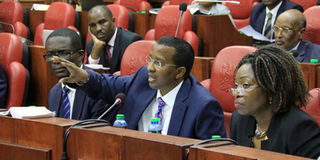Easy solutions that leave our problems intact

Front, from left: Independent Electoral and Boundaries Commission Chief Executive Officer Ezra Chiloba, chairman Isaac Hassan and vice-chairman Lilian Mahiri-Zaja before a joint parliamentary select committee on the electoral body at Parliament in Nairobi on August 2, 2016. PHOTO | JEFF ANGOTE | NATION MEDIA GROUP
What you need to know:
- The basic assumption we have made is that religious leaders of whatever persuasion are more likely to be upright individuals without ethnic or political proclivities compared to their flock.
- There are times in our history when religious leaders have played divisive roles in our politics.
- We have seen religious leaders engage in conmanship and criminal activities and cover themselves with religious gobbledegook.
- Our choice of religious leaders to perform a State function more fundamentally offends a core principle of the constitution.
There seems to be an emerging consensus that in resolving the stalemate at the Independent Electoral and Boundaries Commission (IEBC) “ordinary Kenyans” must be kept at bay due to their querulousness and obvious ethnic bias in political decision-making.
This is especially important in appointing the panel that would then vet and recommend for selection the next set of commissioners. Our national psyche is afraid that “ordinary Kenyans” will be tempted to recommend commissioners based on their relatedness or perceived political leanings.
As a result, a recommendation has emerged that religious leaders should be the only ones allowed to populate the panel that will do the difficult job of giving the country the new team to conduct the next General Election.
This is an obvious choice to most Kenyans, because it is very easy. The basic assumption we have made is that religious leaders of whatever persuasion are more likely to be upright individuals without ethnic or political proclivities compared to their flock.
The question that emerges then is whether this assumption is accurate. From my perspective, I think it is a lazy, ill-considered idea operating on flawed assumptions and extremely high expectations. It stands to reason that Kenyan religious leaders are not, by virtue of their positions alone, particularly unbiased.
There are times in our history when religious leaders have played divisive roles in our politics, and indeed some have used their positions as religious leaders to ascend to political leadership.
Our assumption that being a religious leader automatically eliminates one’s association with family and ethnic fellow-travellers is therefore obviously misguided and ought not be the basis for making important national decisions.
CRIMINAL ACTIVITIES
For instance, we have seen religious leaders engage in conmanship and criminal activities and cover themselves with religious gobbledegook.
We ought to have realised that when the chips are down, our religious leaders are no different from the flocks they minister to. They are just as prone to ethnic favouritism and other retrogressive practices as the rest of us, and religious leadership does not confer any special protection from this phenomenon.
Our choice of religious leaders to perform a State function more fundamentally offends a core principle of the constitution, that the State and religious institutions shall remain separate.
In my view, once State institutions start consorting with religious groups, there is no telling how it will end. What we know is that it will not end well. Eventually the dominant religion will start influencing State decisions and, before long, the entire nation will be beholden to a cabal of Rasputins forcing decisions in their own favour, but in the name of religion.
In this country, we have a history of seeking easy solutions to difficult problems. This would be a good thing if the easy solutions were also the right ones for our problems. Unfortunately, they almost always tend to simply paper over cracks and sweep the garbage under the carpet, leaving the problem unresolved.
In the case of IEBC, the real problem as articulated by the accusers is that the commission engaged in fraudulent transactions that enriched some of its members and employees at taxpayers’ expense.
Other accusations touch on mishandling of elections either deliberately or due to gross incompetence resulting in disputed results. The solution, a “dignified exit” for the accused, and the involvement of presumably “white as snow” religious leaders in selection of a new team, is as temporary as temporary can be, because it offers no guarantees of political stability.
The real solution is to provide for permanent legal mechanisms for establishing institutions that run elections, and letting them do their job. We must also create mechanisms that deliver expeditious rulings in case of disputes, no matter the parties involved.
Atwoli is associate professor of psychiatry and dean, School of Medicine, Moi University; [email protected]





